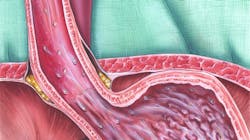How to refer patients with erosion to a gastroenterologist
The rise of silent reflux
Silent reflux (laryngopharyngeal reflux) is on the rise.1 This is particularly alarming because this condition doesn’t show signs or symptoms—other than enamel erosion—but can still cause cancer. Silent reflux has been linked to sleep disorders, and according to the Esophageal Cancer Action Network (ECAN), some researchers recommend that all patients with sleep apnea should be evaluated for gastroesophageal reflux disease (GERD).1 According to the Mayo Clinic, chronic refluxing can lead to a condition called Barrett’s esophagus, in which “tissue in the [esophagus] is replaced by tissue similar to the intestinal lining.”2 This condition is associated with an increased risk of the development of esophageal cancer.
Why patients don’t report their symptoms
Since we live in the days of Dr. Google and self-medication, patients often choose not to consult with a medical professional about their symptoms. Also, over-the-counter medications have been so effective for heartburn and acid indigestion that patients don’t feel the need to discuss it with health-care providers. This is why the ECAN has petitioned the US Food and Drug Administration to include a prominent warning label on over-the-counter heartburn medications reading the following: “Persistent heartburn can indicate increased risk of developing esophageal cancer. This medication will not eliminate that risk.”3
Signs and symptoms of esophageal cancer4
- Difficulty swallowing (dysphagia)
- Weight loss without trying
- Chest pain, pressure, or burning
- Worsening indigestion or heartburn
- Coughing or hoarseness
How to screen for reflux
Currently, there are no early screening tools. making treatment and survival rates much lower. Erosion on the palatal surface of the maxillary anterior sextant and cupping of the mandibular first molar’s cusps is associated with refluxing or bulimia, and can be the first sign of esophageal disease. Intraoral pictures have been an asset in tracking erosion progression. In our office we also use a rating scale of mild, moderate, or severe. Mild notes enamel erosion that has caused a smooth, shiny appearance due to the loss of anatomy. Moderate notes when erosion has caused the enamel to become thin on the palatal surface, but still present. Severe is used to describe very thin or no enamel present on the palatal surface.
How to refer
Our patients trust us with their health, so it is important to interview any gastroenterologists (GIs) you plan to refer to in order to ensure that they share the same belief about the connection between oral and systemic health. During our interview with our local GI, we explained our concerns about erosion as an early sign of esophageal diseases, which can be seen in the absence of the traditional signs and symptoms. Questions for the GI also included the following:
- What are some of the trends you see with esophageal disease?
- When do you want us to refer patients to your practice?
- What is your belief about the oral-systemic connection of esophageal disease?
Many times, the doctor is not available to speak with you, but an office manager or the nurse is able and willing to consult. Remember, it is out of the ordinary for a dental office to refer patients to a medical specialist, so you may get some funny reactions, but don’t let that deter you. We designed our referral form to outline the oral-systemic link between enamel erosion and esophageal diseases (see sidebar).
As in my first article, I encourage you to step outside of your comfort zone. This is important for our patients’ health and overall well-being. Together we can bridge the gap between oral and systemic health.
References
1. The link between heartburn and cancer. Esophageal Cancer Action Network website. http://ecan.org/facts/the-link-between-heartburn-and-cancer/.
2. Barrett’s esophagus. Mayo Clinic website. https://www.mayoclinic.org/diseases-conditions/barretts-esophagus/symptoms-causes/syc-20352841?_ga=2.94504540.1149811363.1524458790-399016298.1515468714. Published July 13, 2017.
3. FDA petition for cancer warnings. Esophageal Cancer Action Network website. http://ecan.org/ecan-fda-petition/.
4. Esophageal cancer. Mayo Clinic website. https://www.mayoclinic.org/diseases-conditions/esophageal-cancer/symptoms-causes/syc-20356084. Published March 6, 2018.
Example referral letter
[Dental practice logo]
Date: July 1, 2018
Patient Name: Elaine Benes
Patient DOB: January 29, 1962
Dear Dr. Cunningham,
This patient was evaluated in our office today. In our dental practice, we take the connection between oral health and overall health and wellness very seriously and are committed to collaborative care with our patients’ other health-care providers. As you know, emerging science confirms the link between enamel erosion and esophageal disease such as chronic GERD, Barrett’s esophagus, and esophageal cancer, just to list a few.
As such, I am referring this patient to your office for evaluation of their esophagus due to their [mild, moderate, or severe] enamel erosion. If you wish to have intraoral pictures of the patient’s teeth for your records, we would be happy to provide these.
I look forward to collaborating with you in this patient’s care and ask that you not hesitate to contact me directly with any questions, concerns, or relevant information regarding the patient’s care. We look forward to receiving reports of your findings. Thank you and have a great day!
Sincerely,
Vicki Robin, DMD
101 E. 21st Avenue
Anytown, Virginia
(123) 456-7890
Editor's note: This article was originally published in 2018. It has been updated as of November 2024.
About the Author
Rebecca Klaus, RDH
Rebecca Klaus, RDH, fell in love with dental hygiene after she became a dental assistant. This newfound passion led her to attend Coastal Bend College, where she graduated with honors in 2012 and was awarded the Hu-Friedy Golden Scaler Award, which symbolizes clinical excellence and compassionate service. Becky practices dental hygiene in Seguin, Texas.
